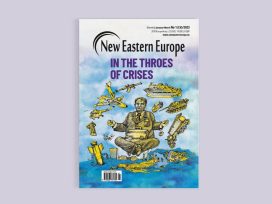
Incomplete Europe
New Eastern Europe 1–2/2023
What the war in Ukraine has taught us about solidarity; why European democrats must insist on fair play; and Moldovan democracy under hybrid attack.
Few articles in the recent past can have been vilified so heavily by so many intelligent people than Francis Fukuyama’s ‘The end of history’, published in The National Interest in 1989. From the moment it appeared, it became de rigueur to cite the article (and the later book of the same name) as the epitome of neocon triumphalism. ‘The end of history’ became a by-word for all that the West failed to understand in ’89 and after.
Now, thirty years on, the article is worth re-reading. Because, unless one is nostalgic for an orthodox version of dialectical materialism, it is hard to find anything to strongly disagree with. On the contrary.
Consider this passage:
The end of history will be a very sad time. The struggle for recognition, the willingness to risk one’s life for a purely abstract goal, the worldwide ideological struggle that called forth daring, courage, imagination, and idealism, will be replaced by economic calculation, the endless solving of technical problems, environmental concerns, and the satisfaction of sophisticated consumer demands. In the post-historical period, there will be neither art nor philosophy, just the perpetual caretaking of the museum of human history.
Triumphalism sounds different.
Fukuyama was also prescient about the politics of the new era:
While [nationalist movements] may constitute a source of conflict for liberal societies, this conflict does not arise from liberalism itself so much as from the fact that the liberalism in question is incomplete. Certainly, a great deal of the world’s ethnic and nationalist tension can be explained in terms of peoples who are forced to live in unrepresentative political systems that they have not chosen.
This is the Weberian principle of verstehen (understanding) as basis for erklären (explanation), applied in textbook fashion. And it is an approach that continues to distinguish Fukuyama’s thinking on the subject of nationalism.
In a new article for Eurozine, Fukuyama writes that, without an effort to understand the attraction of the far-right, it is impossible to respond adequately to its threat. Encapsulating the argument made in his book Identity, Fukuyama argues that the far-right appeal to people’s sense of injustice has its immediate root in leftwing ‘politics of dignity’, and more broadly in modernity itself. Those who accuse him of blame-shifting, take heed. It is liberal democracy that is at stake, not ideological purity.
Elsewhere, Eurozine reports from around the EU in the run up to the May elections. There is much to discover, but look out particularly for Péter Krekó on the Hungarian exception: while Eurosceptic voters in the West want to oust pro-EU elites, the anti-EU elite in Hungary wants to replace the pro-European views of the people. Or Dimitar Vatsov on the Bulgarian hybrid, a cross between democratic ‘façade’ and eastern European oligarchy: ‘As long as there is no true European representation, this hybrid is not just possible, it is increasingly contagious.’
Simon Garnett
Editor Eurozine
This editorial is part of our 9/2019 newsletter. You can subscribe here to get the bi-weekly updates about latest publications and news on partner journals.
Published 2 May 2019
Original in English
First published by Eurozine Newsletter 9/2019
© Eurozine
PDF/PRINTSubscribe to know what’s worth thinking about.

What the war in Ukraine has taught us about solidarity; why European democrats must insist on fair play; and Moldovan democracy under hybrid attack.

What is racism against eastern Europeans? And what did Viktor Orbán learn from Slavoj Žižek?